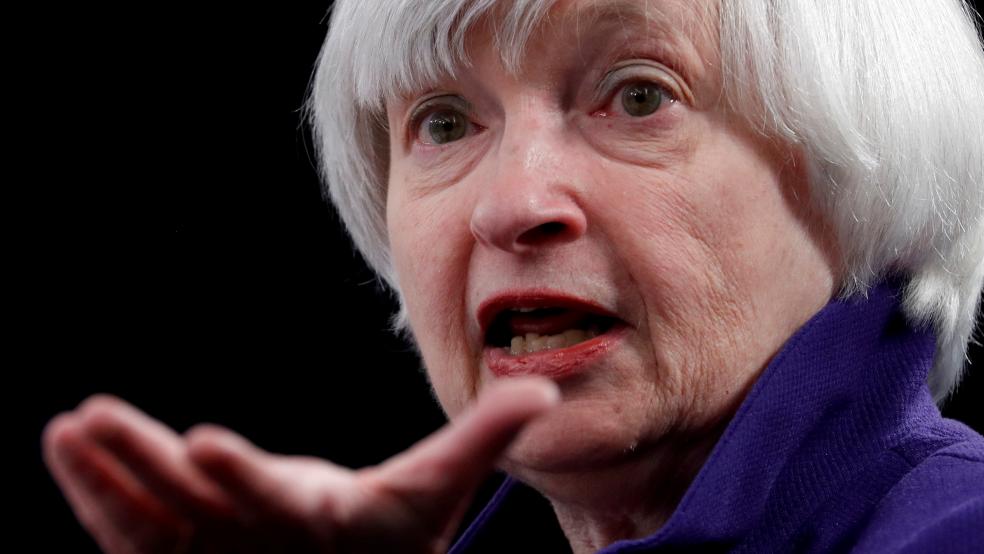Treasury Secretary Janet Yellen on Sunday defended President Joe Biden’s plan to raise taxes on corporations and the richest 1% of Americans, telling CNN that the benefits of increased spending on education and infrastructure outweigh any negative effects that could be produced by the tax hikes.
“The greatest threat to our economic recovery – and our long-term economic prospects – is not a marginally higher tax rate for large corporations or the top 1% of taxpayers,” Yellen said. “It's a lack of support for America's workers and families.”
Yellen explained that the Biden administration sees taxing and spending as inseparably connected and argued that the combination of policies it was promoting would produce a clear benefit in the form of stronger economic growth.
“Asking 'will these tax increases hurt the economy?' is not the right question,” Yellen said. “The right question is: 'Is trading higher taxes on high-income taxpayers for middle-class tax cuts and major economic investments pro-growth?' And the answer to that question is a resounding yes.”
Republicans stick to their guns: GOP opposition to Biden’s plan portrays the proposed tax increases as something close to an economic disaster. In the Republican response to Biden’s address to Congress last week, Sen. Tim Scott of South Carolina charged that Biden was planning “the biggest job-killing tax hikes in a generation.”
Big business tends to agree. As CNN’s John Harwood reports, 98% of CEOs surveyed by the Business Roundtable said the proposed tax hikes would hurt their firms’ competitiveness, and substantial majorities said the increases would result in reduced hiring and R&D.
Given the Republican insistence on the power of tax cuts to produce economic growth, and its supply-side approach more broadly, this opposition to Biden’s plan comes as no surprise. The problem, Harwood says, is that both the historical data and economic modeling don’t show much support for GOP claims.
The Republican “attacks sound familiar because they echo jibes against tax hikes enacted by the last two Democratic presidents,” Harwood says. “As it happened, Bill Clinton oversaw an economic boom and Barack Obama the longest streak of private sector job growth in American history.”
Estimating the effects: Analyses by right-leaning think tanks show negative economic effects from Biden’s proposed tax increases, but the effects are relatively small. The Tax Foundation estimates that Biden’s plan would result in an economy that is 1.62% smaller in 2050, but Republican economist Doug Holtz-Eakin says it would be just 0.2% smaller, once the growth produced by the associated spending is taken into account.
The American Enterprise Institute found an even smaller effect, estimating that the economy would be 0.16% smaller. "I would not say it is a job-killing disaster," AEI's Kyle Pomerleau told CNN.
Other think tanks have produced more positive results. The Penn-Wharton Budget Model found that Biden’s tax increases would slightly reduce the economy by 2030, relative to the baseline, but then increase it by 2050. Economist Mark Zandi of Moody's found similar results, with the tax producing a short-term drag but then higher growth as the spending kicks in.
Challenging the tax cut faith: While Republicans are sticking with the economic ideology they have embraced for four decades, the Biden administration is trying to revive the idea that taxes can help pay for social investments that eventually produce higher growth.
Washington Post columnist Jennifer Rubin argues Monday that the problem for the GOP is that its faith in its fiscal policies is drifting ever further away from the facts on the ground. “Republicans simply ignore the mountain of evidence disproving the benefits of supply-side tax cuts,” Rubin writes, adding that decades of research suggests that tax policies have little effect on growth and employment.
Yellen argues that the Biden plan marks a turning point in Washington’s approach to taxing and spending. “Since the Reagan years, we've been enduring a particularly potent economic ideology in this country -- one that says tax cuts, as a rule, promote growth while government investment, as a rule, is wasteful,” she told CNN. “This ideology has never made much sense given what we know about the payoffs from government investments in people, infrastructure and R&D.”




